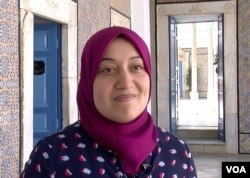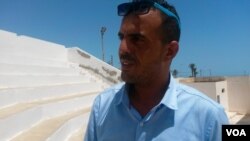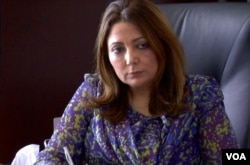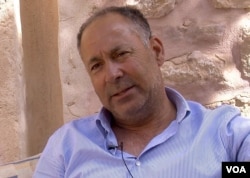Sayida Ounissi watched Tunisia’s 2011 revolution unfold as a political refugee in France.
Fares Said was a university student, pelting rocks at police.
Businesswoman Wided Bouchamaoui helped save her country from a new political crisis, while Slah Allani’s textile industry collapsed under the hard economic times.
If Tunisia’s uprising helped to ignite widespread popular revolts that have changed the face of the Arab world, it has also fundamentally reshaped the lives of its citizens.
These four Tunisians illustrate just how radical the changes are. Today, one is a member of parliament, one is a budding playwright, one is a Nobel laureate and one is investing in Tunisia’s heritage.
Rising political star
“I’m full of hope actually,” said Ounissi, 29, now a rising star in the moderate Islamist Ennahdha party, when asked about her nation’s sizable problems, including a struggling economy, soaring unemployment and rising radicalism.
“Things are going slowly, that’s definitely true,” she added. “It’s not easy to see where we’re going, but we definitely have a road map.”
Ounissi didn’t feel that way growing up in exile. Like many Islamists, her family fled the dictatorship of former President Zine El Abidine Ben Ali and settled in France.
Then the unthinkable happened: Thousands took to the streets in 2011, driving Ben Ali into exile.
“I was supporting the movement, encouraging the diaspora, and we had lots of demonstrations in France,” Ounissi said.
Today, Ounissi is one of the youngest members of Tunisia’s parliament. Ennahda recently announced it has discarded political Islam, presenting itself as a secular party with religious roots.
“It’s a kind of pragmatism of Ennahda,” she said. “It wants to be sure it’s still relevant to Tunisia today.”
She believes Tunisia faces big challenges, notably finding jobs and options to radical Islam in a country considered a leading exporter of jihadist fighters.
"We need to convince young people they have more interest in acting for their country rather than against it,” she said.
Changing things locally
From the southern town of Zarzis, Fares Said, 33, is responding to disaffected youth in a different way — writing provocative plays and volunteering at a local radio station.
“We need to change young people’s ideas and give them a positive outlook,” he said. “If we don’t do theater, music and culture, we can’t live.”
A local theater group has recently staged his four-part play that takes on subjects, including religion and women, considered taboo in the conservative region where he lives.
“We got lots of applause and there was lots of debate," he said. "A few called us cockroaches, but the audience threw them out.”
Said believes art can bring about change. His radio station recently interviewed a repentant jihadist who has since become a popular rapper.
“Art is something where people can really express themselves, exchange ideas and imagine themselves,” he said. “Little by little, they have a dream.”
A Nobel for saving Tunisia
Becoming a Nobel laureate was not part of Wided Bouchamaoui’s career plans. But last December, Bouchamaoui, who heads the UTICA employers union, joined three Tunisians accepting the Nobel Peace Prize on behalf of their civil society groups.
As strikes and political assassinations paralyzed the country in 2013, their Tunisian National Dialogue Quartet stepped in, using mediation and dialogue to usher in an interim government that paved the way for new elections.
She, too, is worried about the rise of militant Islam in Tunisia.
“We need security, but we also need reforms, to create jobs and be in those difficult areas,” Bouchamaoui said.
Still, Bouchamaoui is proud of what her country has achieved.
“We are now a democratic country. We have a strong civil society, very dynamic young people, very emancipated women,” she said. “But the challenge for us is so big. We need to succeed in this fragile political transition.”
Preserving Tunisia’s heritage
Industrialist Slah Allani watched Tunisia’s revolution spill over to his textile business.
“There were strikes and demands,” he said. “Everyone wanted a job, even though the business couldn’t absorb all the work.”
Tunisia’s economy was in free fall. Allani resisted for three years before finally shuttering his factories.
He turned instead to nurturing a whimsical tourism project in the resort island of Djerba.
First came a small hotel, boasting local artifacts. Now, Allani is restoring vast chunks of the small village of Erriadh, with plans to open a gallery.
Sitting next to his hotel pool, swifts flashing and diving overhead, he ticked off his personal list of national priorities.
“First, corruption must stop in all areas,” he said. “Second, people need initiative, security and options to work.”
He believes politicians must set aside partisan squabbling, at least for now, and work toward those common goals.
“We need a viable program for the population, for poor people,” he said. “If that happens, then I think Tunisia will have a promising future.”



